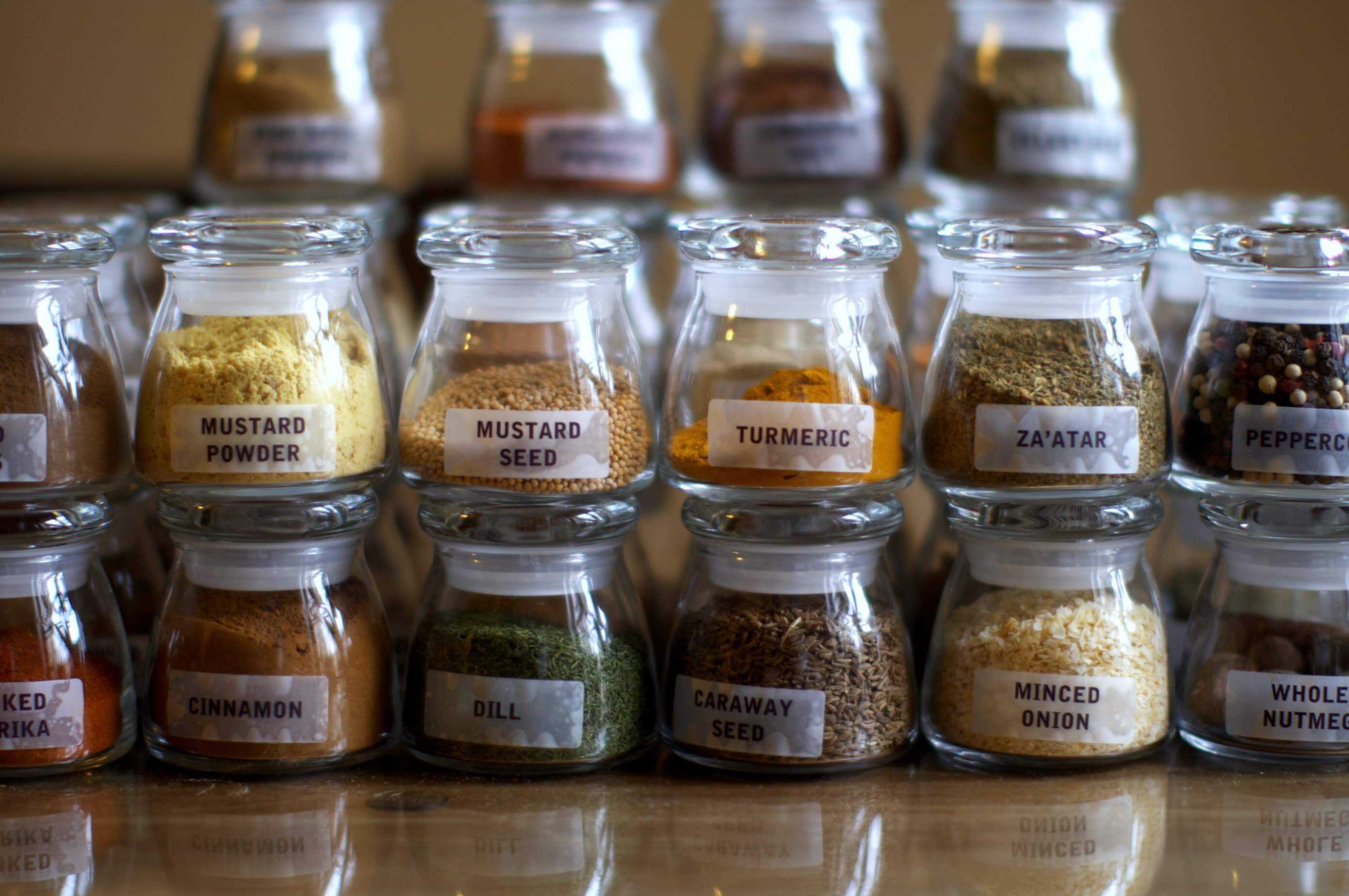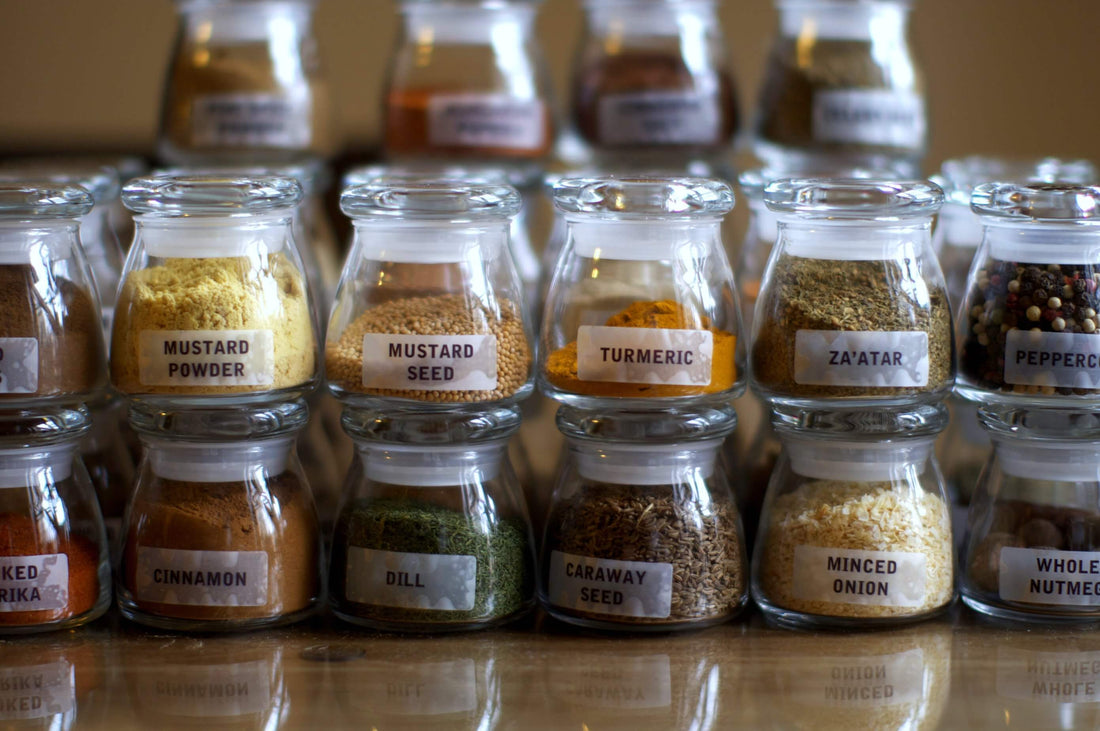
They say that variety is the spice of life, but how do you know if you're getting everything out of that spice? I get a lot of questions about spices: How long do spices last? When should I throw my spices out? Where should I store my spices? How do I know if a spice has gone bad? Is there any way to revive an old spice? What containers are best for storing my spices? Which spices are best to buy in bulk? Can I freeze my spices? Let's break it down.
How long do spices last?
The good news about spices is that they virtually last forever. It's rare, if not impossible, for a spice to go "bad." The biggest threat of time is that it causes spices to lose potency and flavor. Ground cinnamon that's three years old will not carry as much flavor as cinnamon that's only three months old. There are some people who recommend tossing out spices after six months, but I think that is ridiculous. Whole spices like cinnamon sticks, whole cloves, and peppercorns last for years and years. Ground spices have a shorter shelf life because their surfaces are more exposed to the elements, but can still be good for 1-2 years, easily. If you're concerned about a particular spice, try these two tricks:
1. Smell it. If you get a rich, aromatic nose full, it's fine. If you hardly smell anything at all, it's probably time to toss it.
2. Observe the color. Spices usually retain their rich color, especially if they're kept in a cool, dark place. If the spice has a gray or muted tone and no aroma, it's likely that it's past its prime and should be tossed. It won't make you sick if you use it, but it won't add the flavor you're looking for.
When should I throw my spices out?
Toss them if they have lost color, all flavor, or if the container has been compromised in some way to allow water or anything else inside. I err on the side of keeping them around.
Where should I store my spices?
A cool, dark spot in your kitchen is best. Avoid cupboards or drawers that are directly above or below your stove top, or above or next to your dishwasher. Temperatures fluctuate more in those areas than any other, and your goal is to keep your spices cool, dry and in the dark. Air-tight containers will preserve the life of your spices as much the temperature and lack of sunlight.
How do I know if a spice has gone bad?
As mentioned, it's rare and almost impossible for a spice to go bad. It could happen, however, if the spice was contaminated by moisture or food particle that got inside the container. The most reliable way to know is to smell it. "The nose knows," my mom always said, and she's right. Your nose and senses will react to a rancid, rotten smell like a quick reflex.
Is there any way to revive an old spice?
Yes! With heat! If you smell a spice and get an aroma that's somewhere in between strong and weak, try crushing some of the spice in your hands for 5 seconds or heating it slightly in a pan on the stovetop before adding it to a dish. The heat from your hands or the stove will revive some of the flavor that's fading. You should also use more of that spice than is called for in the recipe, since it's not as potent.
What containers are best for storing my spices?
An air-tight cap that seals is the most important feature of your container. Tin cans, though adorable, are subject to moisture and rust, so I tend to stick with plastic.
Which spices are best to buy in bulk?
It depends on which spices you use the most. I use a lot of cumin in my cooking, so I buy a large bulk container that lasts me about a year. The same goes for cinnamon. Whole spices, like nutmeg, cinnamon sticks, peppercorns and whole cloves are safe to buy in bulk because they last for years and years. Whenever possible I use fresh herbs, so I buy dried basil, rosemary, thyme, dill, and parsley in smaller containers to use when fresh is not available.
Can I freeze my spices?
While it may preserve the shelf life, condensation will do more damage. It seems like a great idea, but it's not.
Other helpful tips:
- Take the guesswork out of your spice's age by jotting down the month and year with a permanent marker on the bottom of the container when you buy it.
- Shop for spices at a spice market or natural foods store, where you can usually buy them from bulk containers by the weight. They are usually less expensive and you can buy only what you need.
- Never shake your spices directly over the food you are cooking. The heat and humidity from steam or splatters can get inside the container and cause them to age faster, and could possibly spoil them.
Any other questions or ideas? Use the comments section!
{Image via
Smitten Kitchen.}
P.S.
Shop online to get
cookie gift baskets and other delectable treats delivered. From
birthday cookies, to holiday must-haves, send deliciousness to your loved ones.


